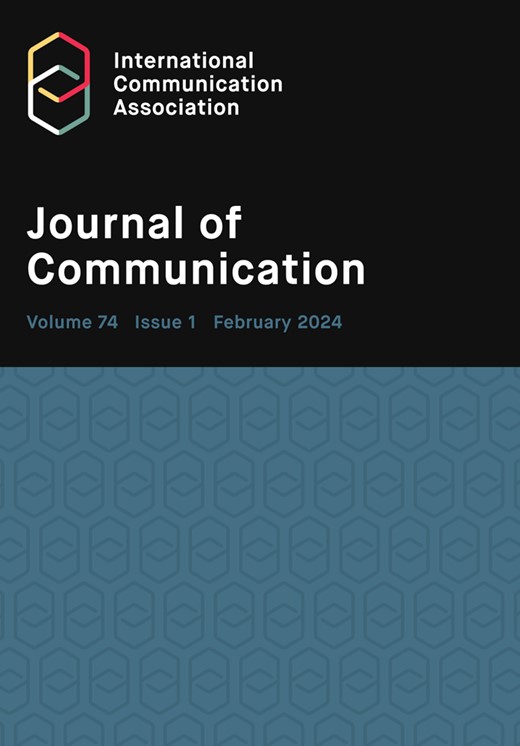The journalistic preference for extreme exemplars: educational socialization, psychological biases, or editorial policy?
IF 5.5
1区 文学
Q1 COMMUNICATION
引用次数: 0
Abstract
Exemplars are central in news reporting. However, extreme negative exemplars can bias citizens’ factual perceptions and attributions of political responsibility. Nonetheless, our knowledge of the factors shaping journalistic preferences for including exemplars in news stories is limited. We investigate the extent to which educational socialization, psychological biases, and editorial policy shape journalistic preferences for extreme negative exemplars. We field large-scale survey experiments to a population sample of journalism students, a nationally representative sample of citizens, and a representative sample of “young people” and obtain evaluations of news value, newsworthiness, and behavioral measures of the actual write-up of news articles. We find significant support for the role of editorial policy and limited support for the role of educational socialization and psychological biases. In a time where economic pressures and the proliferation of digital media potentially lead editors to prioritize clickbait, these findings suggest that structural biases in news coverage may be aggravated.新闻界对极端典范的偏好:教育社会化、心理偏见还是编辑政策?
典范是新闻报道的核心。然而,极端的负面典范会使公民的事实认知和政治责任归属产生偏差。然而,我们对影响新闻工作者在新闻报道中纳入典范的偏好的因素了解有限。我们研究了教育社会化、心理偏见和编辑政策在多大程度上影响了记者对极端负面典范的偏好。我们对新闻专业学生样本、具有全国代表性的公民样本和具有代表性的 "年轻人 "样本进行了大规模调查实验,获得了对新闻价值、新闻价值的评价以及对新闻文章实际撰写的行为测量。我们发现,编辑政策的作用得到了极大的支持,而教育社会化和心理偏见的作用得到了有限的支持。在经济压力和数字媒体激增可能导致编辑优先考虑点击诱饵的时代,这些研究结果表明,新闻报道中的结构性偏见可能会加剧。
本文章由计算机程序翻译,如有差异,请以英文原文为准。
求助全文
约1分钟内获得全文
求助全文
来源期刊

Journal of Communication
COMMUNICATION-
CiteScore
11.60
自引率
5.10%
发文量
41
期刊介绍:
The Journal of Communication, the flagship journal of the International Communication Association, is a vital publication for communication specialists and policymakers alike. Focusing on communication research, practice, policy, and theory, it delivers the latest and most significant findings in communication studies. The journal also includes an extensive book review section and symposia of selected studies on current issues. JoC publishes top-quality scholarship on all aspects of communication, with a particular interest in research that transcends disciplinary and sub-field boundaries.
 求助内容:
求助内容: 应助结果提醒方式:
应助结果提醒方式:


